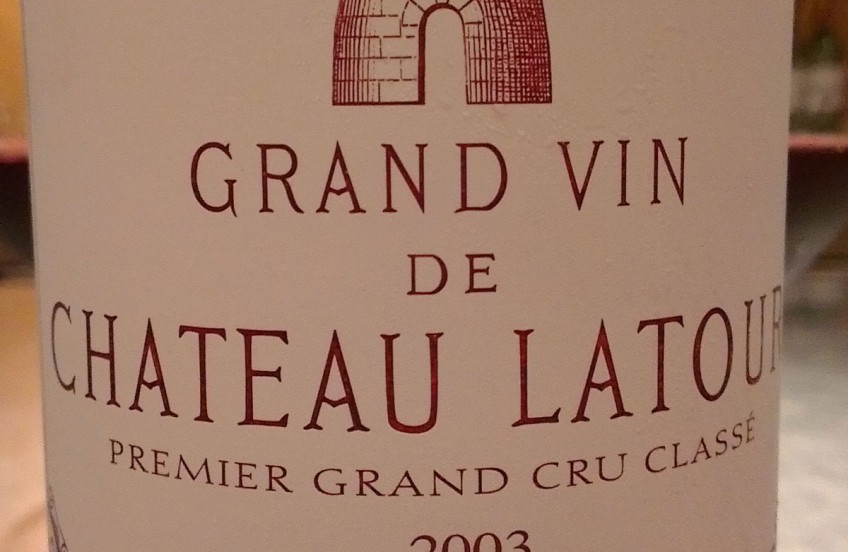Nature's potent effect on the 2003 vintage

I write this from Nice, France, where the temperature at midday can be as high as 33 degrees C - dry and hot! There is a heatwave in Europe now which brings back memories of the summer of 2003 when temperatures in June shot sky-high, causing many deaths from heat stroke. (Even though there is air-conditioning in my Nice hotel room, it is not designed to be as effective as the one back home!)
The severe drought which inevitably accompanied the heat during the growing season deeply affected the vines and the wines, resulting in greatly reduced production, high sugar levels and low acidity. But I am happy to report now that the wines that were produced are proving to be very good indeed.
One of the very first words of wisdom I received when I started learning about wine was that wine is about people. What people? The growers first and foremost, and then who else? The people you drink with, of course. You do not drink wine alone - unless you are a miserable misanthrope!
Plato believed that the enjoyment of wine becomes more important as the years pass, explaining that wine is "the cure for the crabbiness of old age whereby we may renew our youth and enjoy forgetfulness of despair". Plato's Symposium is a living expression of his advice: "Life must be lived as play. You can learn more about a man in an hour of play than in a year of conversation."
But as true and wise as those observations and advice are, I have found that they do not help you understand more about the wine itself. As I get to know and understand the wine-growers and wine-makers of the great wines of France, Italy, Germany, Spain and Austria, the more I am beginning to understand that while wine is about man, the most important connection is that between wine and nature.
Wine needs Nature. Period. This is not as obvious as it should be because the study of wine for the ordinary wine lover tends to focus on the Wine and the People.
Perhaps this has been in large part unavoidable - you can see the wine, hold it in a glass, and taste and drink it, and as for the people, you can understand that as the people who grow and make the wine, the people who market it and the people who talk and write about it.
But why and how are wine and nature related? It is relatively easy to understand the importance of terroir, climate and the way in which the vines are grown and cultivated because that is all visible and easily assimilated. But the relationship with Nature?
There is a growing study on the effect of wine-growing practices on nature and ecosystems - vitecology - that now occupies the attention of conservationists and agriculturalists. The study of wine and wine-growing on ecosystems is a vast and fascinating subject.
How does all this affect the wine lover? Take a very simple example of the relationship between wine and nature. The 2003 vintage in Europe continues to intrigue me. Here was a vintage affected by extreme heat and drought during the growing season. The result was considerably diminished production, very concentrated wines, very ripe fruit and a possible shortage of acidity. How will the wines develop? Barrel tastings during the en primeur campaign in 2004 allowed for some preliminary assessment of the wines.
Young and stunning
At the top properties, the wines were found to have very good fruit, good density and concentration, but there was concern whether they had enough acidity and freshness to balance the very ripe fruit.
It is now 12 years on and answers are beginning to emerge.
One of the very first of the Bordeaux 2003s I had the good fortune to drink was the second wine of Château Cos d'Estournel, Pagodes de Cos 2003, in September 2006 at a dinner in a private home in Singapore. I noted that it was dark red, with a full nose of very ripe cabernet fruit, good body, dense concentration and good ripeness. Clearly still very young but at the same time very attractive.
Normally I have enough patience to wait 10 years before trying a First Growth. But my curiosity overcame my patience and I decided that it was time, at eight years of age, to open my first bottle of Château Latour 2003 at a tasting in February 2011.
It was stunning! Huge, powerful, deeply concentrated, loaded with fruit, blackcurrants, and very rich - yet with sufficient acidity to balance the dense fruit.
It was clearly not ready, but the potential could be seen - or rather tasted. Very, very attractive, very Latour. At eight years old, it was far too young even for a Latour from a more average vintage. But for a 2003 Latour the impression I had was (a) a preview of the eventual character, and (b) this Latour 2003 was classic and characteristic, notwithstanding the severe heat and drought.
I have since drunk Latour 2003 two more times - two years later in February 2013 and most recently in April 2014 at Robuchon's Atelier in Resorts World Sentosa.
On this last occasion Latour 2003 was already 11 years old. Still an adolescent but what an adolescent!
When will this wine be ready? I think at the ripe age of 20 years, that is, in 2023. (Readers who know me may understand why I am tasting my Chateau Latour 2003 so young - I do not think I can wait that long!)
The second part of this piece on "Wine and Nature" comes out next week.

This article was first published on July 03, 2015.
Get The Business Times for more stories.